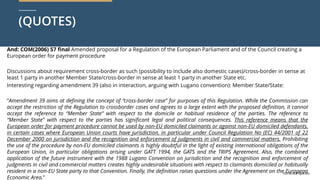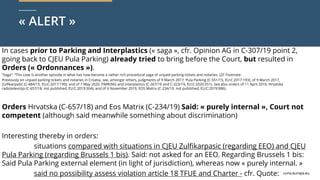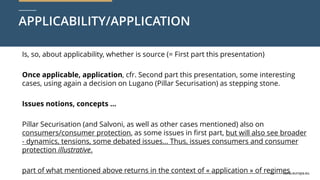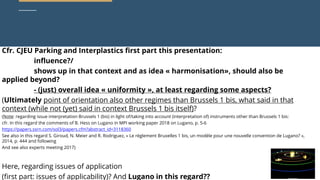The document discusses the harmonized interpretation of judicial cooperation in civil matters, highlighting recent case law from the Court of Justice of the European Union concerning the Brussels 1 bis Regulation, the Lugano Convention, and second-generation regulations. It emphasizes the importance of understanding the applicability and application of these regimes, particularly regarding cross-border issues and consumer protection, as well as the ongoing dynamics within judicial cooperation. The presentation aims to explore issues of consistency and potential harmonization among various legal frameworks, while also addressing potential revisions to the Brussels 1 bis regulation.












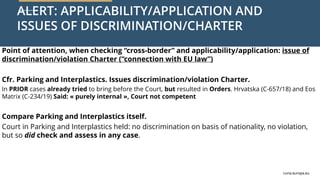



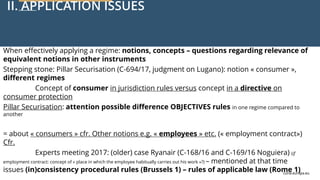


















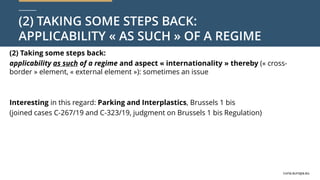



![curia.europa.eu
curia.europa.eu
(QUOTES)
Document Commission mentioned in CJEU ZSE Energia, on ESCP:
Com(2013)794 : Proposal for a Regulation of the European Parliament and of the Council amending Regulation (EC)
No 861/2007 of the European Parliament and the Council of 11 July 2007 establishing a European Small Claims
Procedure and Regulation (EC) No 1896/2006 of the European Parliament and of the Council of 12 December 2006
creating a European order for payment procedure
Preparatory document COM(2013)794 final, proposed amendment ESCP, indicating differences ESCP/Brussels 1 bis.
Cfr. Document p. 6:
“The Regulation currently applies only to disputes where at least one of the parties is domiciled or habitually resident in a Member State other than the
Member State of the court or tribunal seized. However, disputes involving parties domiciled in the same Member State which have an important cross-
border element and could therefore benefit from the European simplified procedure are left outside the scope of the Regulation. Examples include cases
where: • the place of performance of the contract is in another Member State, for example a lease contract for a holiday property situated in another
Member State; or • the place of occurrence of the harmful event is in another Member State, for example when parties are involved in a car accident in
a border region situated in another Member State; or • the enforcement of the judgment is to take place in another Member State, for example when a
judgment must be executed on the defendants salary which he receives in another Member State. In particular, where the claimant may choose under
the provisions of Regulation [(EC) No 44/2001]/[(EU) No 1215/2012] between the jurisdiction of the courts of the Member State where both him and the
defendant are domiciled and the jurisdiction of the Member State where for example the contract is performed or the harmful event took place, the
actual choice of the claimant in favour of the courts or tribunals of the Member State of the common domicile should not have the effect of depriving
him of the possibility to use the European Small Claims Procedure which would otherwise be available.”](https://image.slidesharecdn.com/defffpowerpointlugano-230123075952-1f4d0690/85/Harmonized-interpretation-of-regimes-of-Judicial-cooperation-in-civil-matters-Some-notes-on-recent-case-law-of-the-Court-regarding-Brussels-1-bis-Lugano-and-the-second-generation-regulations-40-320.jpg)
![curia.europa.eu
curia.europa.eu
(QUOTES)
(Proposal at the time:
Proposed recital:
“(6) The European Small Claims Procedure applies to all claims with a cross-border element. This includes cases where the parties are both
domiciled in the same Member State and only the place of performance of the contract, the place where the harmful event takes place or the place
of enforcement of the judgment is situated in another Member State. In particular, where the claimant may choose under Council Regulation (EC)
No 44/200115[Regulation (EU) No 1215/2012 of the European Parliament and of the Council16] between the jurisdiction of the courts of the
Member State where both him and the defendant are domiciled and the jurisdiction of the courts of the Member State where the contract is
performed or the harmful event took place, the actual choice of the claimant in favour of the courts or tribunals of the Member State of the
common domicile should not have the effect of depriving him of the possibility to use the European Small Claims Procedure which would otherwise
be available. Furthermore, the European Small Claims Procedure should also be available in cases lodged before courts of EU Member States by or
against third country residents. (7) This Regulation should apply only in cross-border disputes, but nothing should prevent Member States from
applying identical provisions also to purely internal proceedings concerning claims of a low value.”
Proposed Article:
“2. This Regulation shall not apply where, at the time when the claim form is received by the court or tribunal with jurisdiction, all of the following
elements, where relevant, are in a single Member State: (a) the domicile or habitual residence of the parties; (b) the place of performance of the
contract; (c) the place where the facts on which the claim is based arose; (d) the place of enforcement of the judgment; (e) the court or tribunal
with jurisdiction. Domicile shall be determined in accordance with [Articles 59 and 60 of Regulation (EC) No 44/2001]/[Article 62 and 63 of
Regulation (EU) No 1215/2012].”)](https://image.slidesharecdn.com/defffpowerpointlugano-230123075952-1f4d0690/85/Harmonized-interpretation-of-regimes-of-Judicial-cooperation-in-civil-matters-Some-notes-on-recent-case-law-of-the-Court-regarding-Brussels-1-bis-Lugano-and-the-second-generation-regulations-41-320.jpg)


